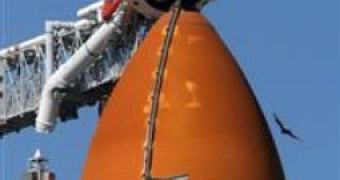After the aborted liftoff on the 6th of December, NASA had to cancel the second launch attempt that was scheduled to take place yesterday. The glitch in the fuel sensors was apparently fixed until the filling of the external liquid fuel tank began and one of the gauges started giving false readings again.
Due to the fact that after the 13th of December the International Space Station's solar panels will have an angle that will affect the station's powering, which will make the installation of the Columbus module unfavorable, NASA officials decided to further delay the launch of the Atlantis space shuttle until January next year, in the hope that technicians will better understand the perplex and persistent fuel sensor glitch. However, there is the possibility that Atlantis will not be able to fly if the problems with the fuel gauge continue.
Three of the four fuel gauges indicating the levels of fuel in the hydrogen fuel tank malfunctioned without explanation on Thursday during the first launch attempt. Similar problems have been experienced during previous launches of the space shuttles. NASA space shuttle launch protocol states that the liftoff can be resumed if one of the four gauges failed. During the maintenance after the Thursday failed attempt to launch technicians have been able to fix the problem, but on Sunday, just an hour after the external tank began filling for an afternoon liftoff, the fuel gauge problem reappeared, thus forcing the shuttle managers to stop the countdown and call everything off, after they said that they would do so if one of the fuel gauges acted up again.
This annoying glitch has been carried around by NASA for the last two years or so, thus an engineering team has been established to come up with a quick fix to that problem to further avoid any other delays in the ISS building schedule. According to NASA officials, the engineers will have a preliminary report by Tuesday. Although most of the inspection and repairs can be made with the space shuttle on the launch pad, there might be a possibility that it will be returned to the hangar for more invasive work, preventing its launch in January, therefore further delaying the mission.
As a result of these problems, NASA resorted to stricter rules for the Sunday's launch attempt regardless of some of the engineers' objections requiring that all of the four fuel gauges work for the next flight attempt, while until now it was allowed that the liftoff be carried out even if one of them failed. Also the launch window was reduced from five minutes to only one minute for a plus of safety.
The fuel gauges are a critical part of the engine cutoff sensors that control the engine shutdown when running out of fuel, which could result in a catastrophic situation.
Due to the fact that this problem has been carried around ever since 2005 when the space shuttle flights were resumed, two engineer groups inside NASA suggested that this particular flight be postponed and the fuel gauge system subjected to a test to find out why this problem keeps occurring. However, on Sunday, when it came to the final vote for the launch attempt, they didn't oppose it.
Until the engineers figure out where this problem is originating from, all of the seven members of the Atlantis STS-122 mission will return to their home base in Houston.
European Space Agency officials, have been greatly disappointed with Atlantis' performance, since they have been waiting for more that twenty years to get the 2 billion dollar Columbus module into space, as several design problems in ISS building plans occurred, Russian troubles, which slowed down the construction, and led to the tragedy of the space shuttle Columbia that grounded NASA's space shuttles for two years. However, according to Alan Thirkettle, ESA's space station program manager, a few weeks' delay isn't going to make a big difference, and all that matters is that the shuttle flies safe.

 14 DAY TRIAL //
14 DAY TRIAL //